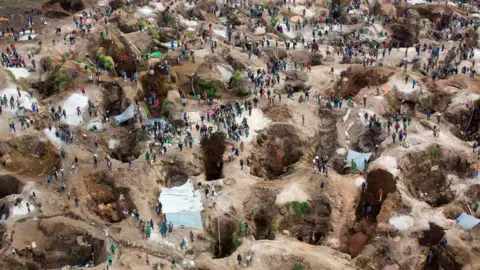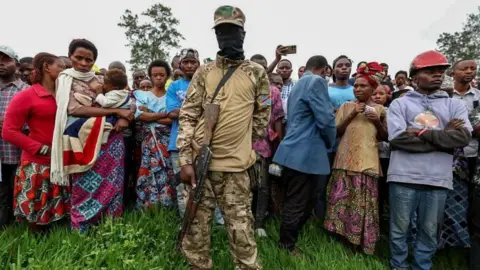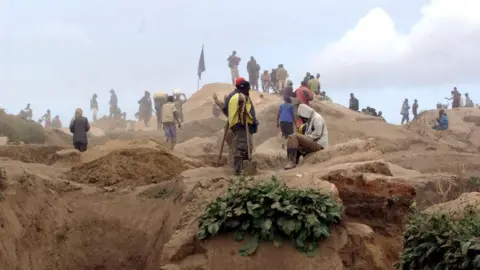Physical Address
304 North Cardinal St.
Dorchester Center, MA 02124
Physical Address
304 North Cardinal St.
Dorchester Center, MA 02124

 Getty Images
Getty ImagesThere is a great chance that there is a small amount of metal within the cell phone that has launched its journey, which has been buried on the land of the Democratic Democratic Republic of Congo, where the war is currently raging.
It may be directly connected to the M23 Rebel group that made global headlines this week.
The tantalum within the device is less than the smartphone and almost all other sophisticated electronic devices are essential for the efficient operation of the device.
The unique properties of this rare blue -gray, shiny metal, including large charge compared to its size, make it an ideal material for small capacitors that temporarily store energy.
They are also mined in Rwanda, Brazil and Nigeria, but at least 40% of the element’s global offer comes from Congo and some key mining areas are now under control of M23.
Current fighting has been going on for months, but rebels have drew attention to Sunday’s Goma basic trade and transport junction. The city bordering Rwanda is the regional center of the mining business
Last year, the M23 made rapid progress east of the mineral-rich Congo democracy and took areas where the Coltan ore, from which the tantalum is extracted.
Like the score of other armed groups in the area, the M23 began as a dress that protected the rights of the endangered ethnic group. However, as the area has expanded, mining has become a decisive source of income, the salary of warriors and weapons.
In April last year, he grabbed Rubaya, the city in the heart of the country’s Coltan industry.
Mineral extracts in this region are not in the hands of multinational conglomerates – instead, thousands of individuals are open pits, which are the landscape or underground honeycomb, under extremely unsafe and unhealthy conditions.
 Monusco
MonuscoIt is part of a complex yet informal network that sees the rocks removed, brought to the surface, crushed, washed, taxed, sold, and then exported to further clean and finally melt.
After the M23 moved to Rubay, the rebels found that the UN expert group called it a “state -owned administration”, issued permits to Diggers and Traders and claim an annual fee of 25 (20 pounds) and $ 250. The M23 has doubled Diggers’ wages to ensure that they continue to work.
It operates the area as a monopoly, making sure that only authorized merchants are able to engage in business through the threat of arrest and detention.
The M23 also charge $ 7 for Coltan every kilogram. The UN expert group estimates that the M23 earns about $ 800,000 a month from the Rubay Coltan tax. This money is almost certainly used to finance the rebellion.
There is a question mark affecting the ore from the M23 -controlled areas to the global supply chain.
The neighboring Rwanda, which is considered to be the support of M23, is at the heart of the answer, says UN experts.
Theoretically, the certification system known as the Innovative Tin Side Chain Initiative (ITSCI) should report that they are frightened by the telephone handlebar and other electronics.
 Epic
EpicThe United States Dodd-Frank’s law adopted in 2010 and a similar piece of EU jogging is to ensure that tin, tantalum, tungsten and gold shopping companies are not accidentally funded by “conflict minerals”.
But ITSCI was under some criticism.
Ken Matthysen, a security and resource management expert at IPIS’s independent research team, emphasizes that the dispersed character of many mines makes it difficult for local authorities to watch exactly what’s going on everywhere.
ITSCI labels should be placed on bags at the mine itself to justify the origin of the minerals, but they often transport it to a collection point where it will be harder to track where the ore actually comes from, Matthysen said.
He added that corruption is also a possible issue.
“They even accuse state agents to selling labels to merchants because they do not make good livelihoods. So merchants go to the eastern part of the Democratic Republic of Congo and mark the bags themselves.”
ITSCI did not respond to the BBC’s request, but in the past defended its records, saying that the system had undergone strict independent control. He was also praised for bringing “prosperity to hundreds of thousands of small miners”.
In Rubaya, ITSCI was soon suspended after M23 entered.
Nevertheless, the group managed to export the Coltan.
UN experts map a circular route that shows how it is transported close to the Rwanda border. They are then moved to the “heavy -duty trucks” that needed to expand the road to accommodate them.
Rwanda has his own colline mine, but experts say the non -uncertain Coltan is mixed with Rwanda production, leading to “significant contamination of supply chains”.
The M23 has already participated in the Coltan store before the Rubaya has been captured – set up road blocks and fees to be crossed, according to Matthysen.
“Most of these minerals went on to Rwanda in the M23-controlled area. So Rwanda has benefited from the Eastern instability of the Congo democracy, and we have seen the amount of exports to Rwanda,” he told the BBC.
 AFP
AFPThe US geological survey data shows that Rwanda Coltan exports increased by 50% between 2022 and 2023. Mr Matthysen said that this could not all come from Rwanda.
In a strong defense of Rwanda’s position, Yolande Makolo, a government spokesman, reiterated the BBC that there were minerals and refinements in his own country.
“It is very cynical to raise a question such as in the eastern part of the KDK, where a persecuted community fights for its rights … and turns it into a financial advantage,” he added.
Rwanda President Paul Kagame also rejected UN expert reports and mocked their “expertise”.
Most of the eastern part of the Democratic Republic of Congo has been destroyed for many years and raises questions about who benefits and the profit of armed groups.
In order to highlight the issue and its relationship with the smartphone industry, the Congo government has filed a criminal complaint in France and Belgium at the end of last year against the technological giant’s Apple subsidiaries, accusing “conflict minerals”.
Apple disputed the statement and pointed out that since the beginning of 2024, due to increasing conflicts and certification difficulties, it stopped obtaining the tantalum among other metals, both from the Democratic Republic of Congo and Rwanda.
Other companies were not so clear that, since the M23 seizes the multiple areas, the small tantalum pieces from the mines, which they control, can still get into the tools we rely on.
 Getty Images/BBC
Getty Images/BBC